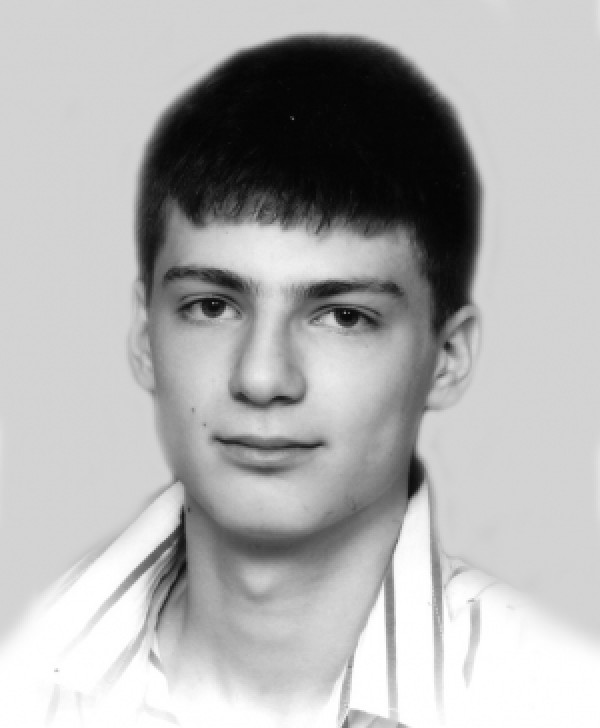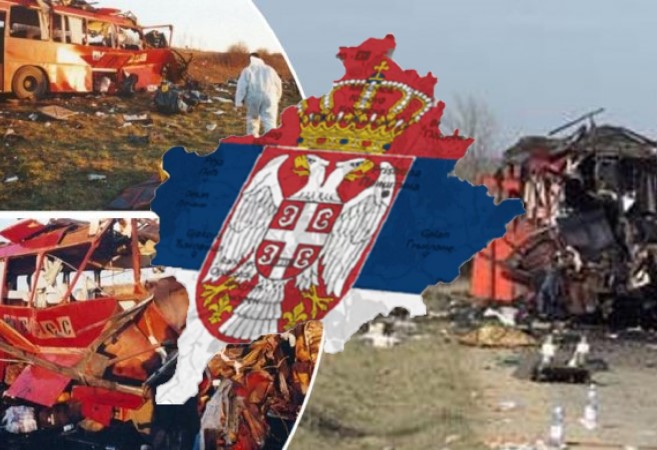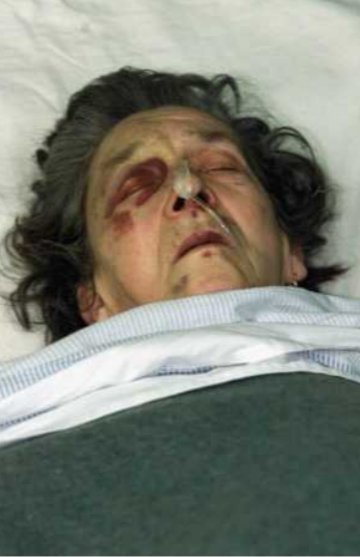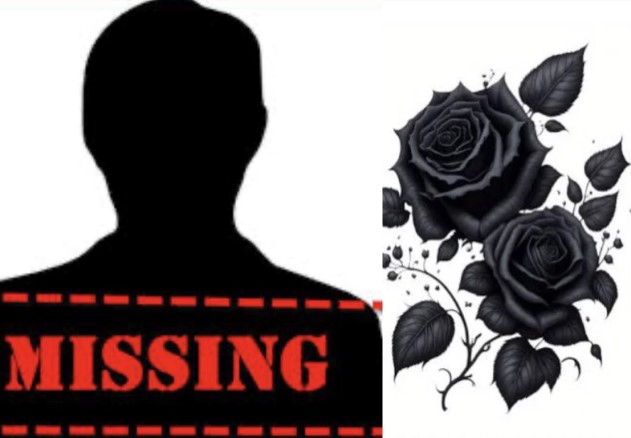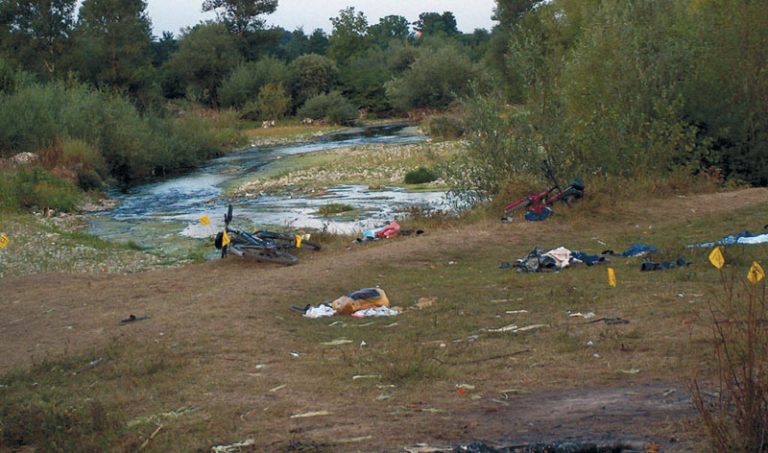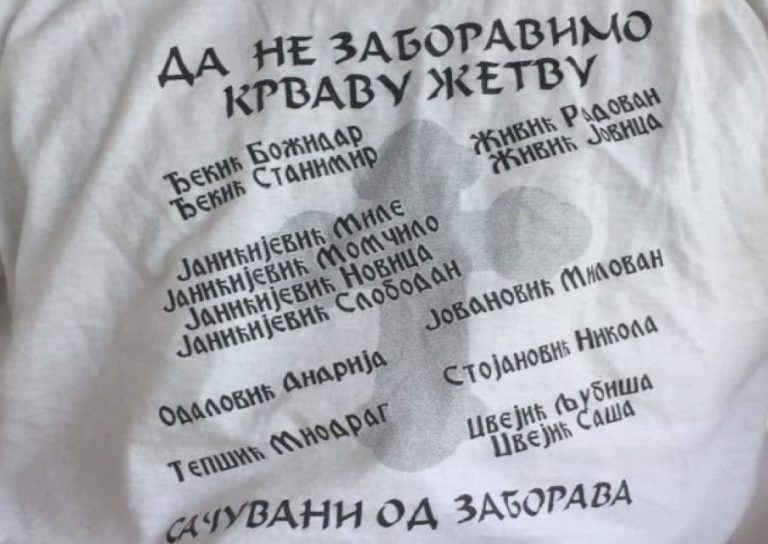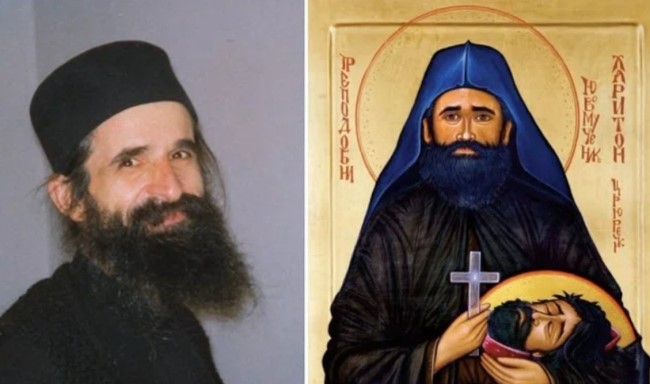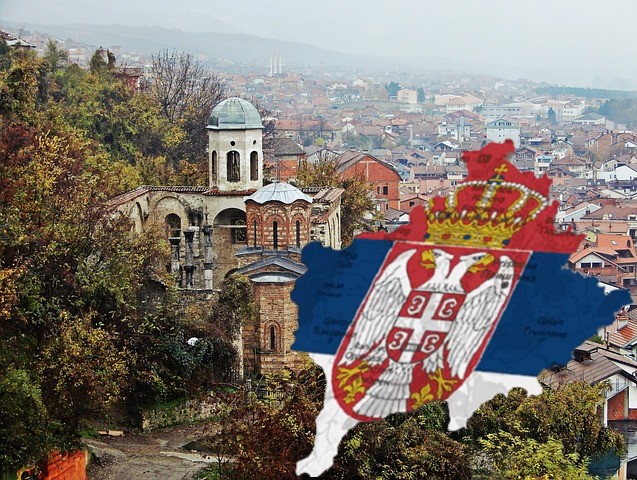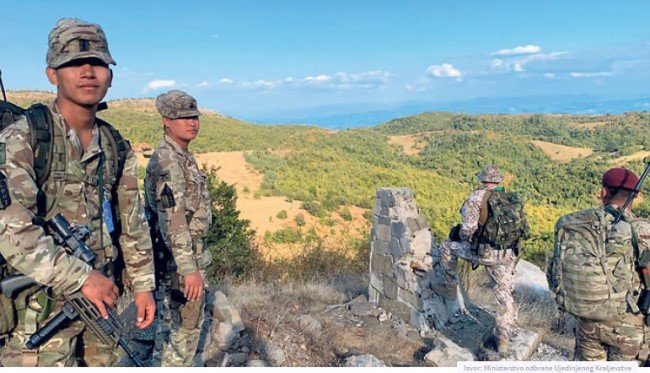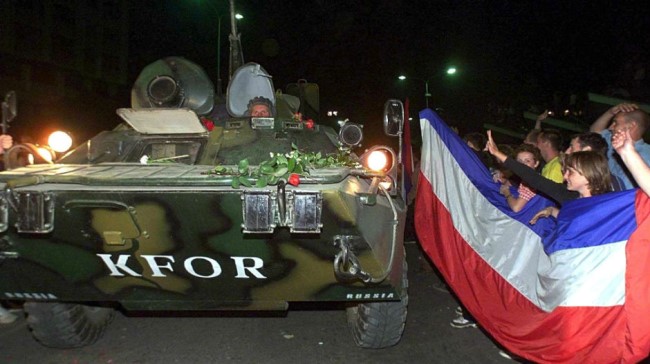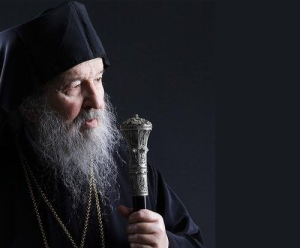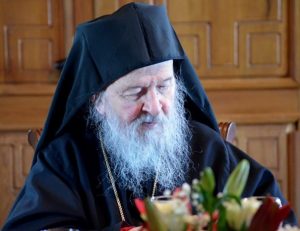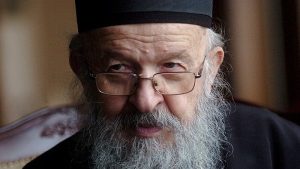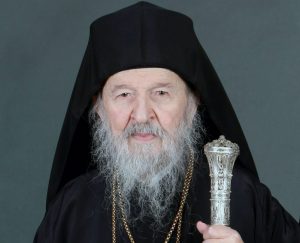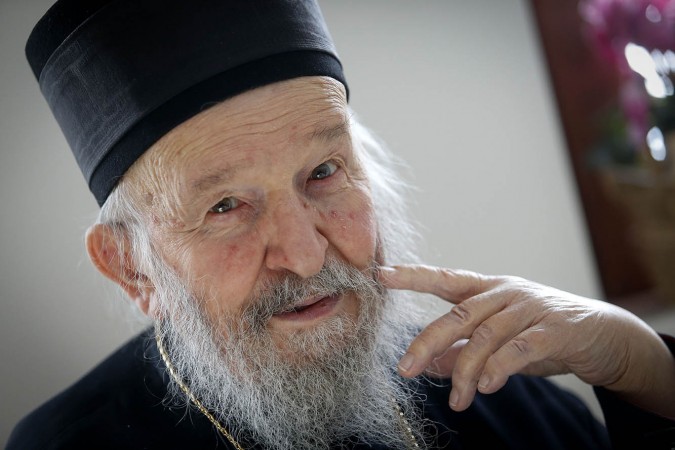
Bishop Artemije: On the Defender of Orthodoxy
- The protection of the faith of Christ "is greater, more valued and more glorious than all benefactors".
Saint Gregory the Theologian
- The protection of the faith of Christ "is greater than all miracles, more saving than all prayers and exploits".
St. Gregory the Couplet
- "It is better to have your tongue cut out, than to remain silent and not defend the true faith, when they try to corrupt it."
Sveti Teodor Studit
Our holy and God-bearing Fathers, whose mouths uttered the above-mentioned thoughts, came to this knowledge by trying to fight to the blood for the preservation of the pure and uncorrupted faith that Christ our God entrusted to us to keep, to live by it and to be saved by it. Saint Maximus the Confessor truly had his tongue cut out in his throat, but he could not agree to remain silent when the enemies of the Truth tried to corrupt the true faith.
That's how it used to be. In recent times, unfortunately, there are more and more of those, alas, among the Orthodox, who forget this paternal Tradition and for one reason or another are ready to compromise with heresies, to concessions and even to outright betrayal of the Orthodox Faith and the Church, adding more and more heretical murky water into orthodox wine. The history of modern Ecumenism unequivocally confirms this.
In all of this, it is comforting and saving for Orthodoxy and the Orthodox that there are still, thank God, awake Orthodox Consciences, which are ready to defend the TRUE FAITH at any time, and to make all possible sacrifices in that just and holy struggle.
The text that follows is the fruit of such vigilant consciences of today's ascetics of Mount Athos, where they all unanimously raised the voice of WARNING in defense of the true faith against those deplorable Orthodox, who are ready for any compromise and betray even the greatest Holy place for the sake of some earthly goals.
The reason for the creation of this truly patristic confessional text was the publication of the official COMMUNICATION of the Mixed Commission for Dialogue between Orthodox and Roman Catholics, adopted at the Conference held from June 17 to 24, 1993. in Balamand (Lebanon), which contains views completely contrary to the canonical tradition of the Orthodox Church. That Conference was held under the presidency of Australian Metropolitan Mr. Stylianos (Patriarchate of Constantinople), and most of the Orthodox autocephalous Churches were represented at it.
The following local Orthodox Churches were not represented in that Commission, which in its insolence "transgressed the boundaries set by our Fathers": Jerusalem, Serbia, Bulgaria, Greece, Georgia and Czechoslovakia.
Our Serbian Church (probably others as well) received an invitation to that Conference, but silently refused to participate in it.
Considering the seriousness of the statements that were signed there on behalf of the Orthodox Church (in principle), and considering that our Holy Church did not give anyone the power of attorney and consent to represent it there and to sign everything that was signed on its behalf, we consider that it is now obliged to take a clear stand on that Statement from Balamand, to condemn it as invalid and thereby give full support to the VOICE OF CONSCIENCE of the Orthodox, so clearly and patristically boldly expressed in the protest text of Svetogorac, which we publish below in its entirety in translation.
Bishop of Raskoprizren
+ARTEMIJE
Sacred Municipality
of Sveta Gora
Athos
Kareya on December 8, 1993.
To His Most Divine Holiness,
the Ecumenical Patriarch, Our Father
and Lord God, Mr. Bartholomew
of Constantinople
Holy Father and Bishop
The unification of the Churches or more precisely the unification of the non-Orthodox with our One, Holy, Catholic Orthodox Church is also desirable for us, to fulfill the Lord's prayer: "that all may be one" (Jn. 17, 21), which we always understand and accept according to the Orthodox interpretation. As Professor Fr. J. Romanidis "... Christ prays here that His disciples and the disciples of His disciples will be one in seeing His glory, even in this earthly life as members of His body, i.e. Churches…"
Therefore, whenever we are visited by non-Orthodox Christians, to whom we show love in Christ and hospitality, we are painfully aware that we are separated in faith and that we cannot have church communion because of that.
The schism, the division between the Orthodox and the Anti-Chalkidonians in the beginning, and the Orthodox and the Westerners later represents a real tragedy, to which we should not get used to, and because of which we should not remain calm.
From this we understand the efforts that are in fear of God and in accordance with the Orthodox Tradition, which have in mind a union, which is by no means possible to occur by keeping silent or minimizing the Orthodox Dogmas or allowing infamous or non-Orthodox (dogmas), because such a union will not be a union in the Truth, therefore, neither will it be finally received by the Church, nor will God bless it, since, according to the father's words, "good is not good, if it is not done in a good way".
On the contrary, it will produce new discords, new divisions and sufferings in this already united body of Orthodoxy. At this point, we would say that against the great changes of events in the countries of the Orthodox presence and in front of the stormy motley course on the world stage, the One, Holy, Catholic "conciliar" and Apostolic Orthodox Church should, on the one hand, strengthen the connection (connection) of the local Churches to devotes himself to the earnest care of wounded limbs and their spiritual education, and on the other hand, with full self-awareness, proclaims and preaches his unique redemptive power and grace to fallen humanity. In this spirit, we follow, as far as our monastic personality allows, the development in the so-called ecumenical movement and the conversations, making sure that sometimes the word of Truth is properly managed, and sometimes there are compromises and concessions on basic matters of faith. Thus, the actions and statements of the representatives of the Orthodox Churches, which are unheard of to this day and completely contrary to our Holy Faith, caused us the deepest sadness.
First of all, we will cite the case of the Most Blessed Patriarch of Alexandria, who stated at least on two occasions that we Christians should recognize Muhammad as a prophet, and no one to this day has recalled this such a misguided Patriarch, who continues to preside over the Church in Alexandria, as if nothing had happened. happened. Therefore, we are extending beyond all-Christian syncretism to all-religious syncretism.
Secondly, we cite the case of the Patriarch of Antioch, who without an all-orthodox decision went into secret communion with the anti-Chalkidonians in Antioch, although the most important issue that some of them do not receive after the 3rd Holy Ecumenical Council, and especially the 4th Ecumenical Council in Chalcedon, has not been resolved. and represents the irreconcilable foundation of Orthodoxy.
Unfortunately, in this case too, we have not seen a single protest from other Orthodox Churches.
However, the most important problem is created with the unacceptable change in the position of the Orthodox, as it results from the content of the joint statement in Balamand (Lebanon) in June (1993), assembled by the mixed commission for the dialogue of the Orthodox and Roman Catholics, which adopts the anti-Orthodox positions to which (that statement) we will mainly to draw your Holiness's attention.
First of all, we should confess that the statements, which Your Holiness sometimes resorts to about the union as an insurmountable obstacle to the extension of the dialogue between the Orthodox and Roman Catholics, reassured us.
However, the text mentioned above gives the impression that your statements are changing and the union is amnestied and called for a theological dialogue, despite the explicit contrary decision of the 3rd All-Orthodox Conference in Rhodes, according to which: "the complete removal of all union agents from the Orthodox countries is respected and the propagandist of the Vatican before starting the dialogue and the subjugation and incorporation of the so-called Uniate churches into the Church of Rome", because "union and dialogue are incongruous at the same time".
That, on the other hand, our apprehensions are justified, among other things, is also evidenced by the article of the Most Reverend Metropolitan of Dimitriad G. Hristodul in the magazine "Piraeus Church", from which we attach some excerpts.
However, the greatest scandal is caused, Your Holiness, by the ecclesiological theses of the said text. We will mention only some basic deviations here.
In paragraph 10 we read: From the reaction (to the Catholic Church, which engaged in missionary work at the expense of the Orthodox, which presented itself as the only one with the pledge of salvation), the Orthodox Church gradually came to adopt the same view of things, according to which salvation is found exclusively and only in her lap. In order to ensure the salvation of the "separated brothers", they went so far as to re-baptize Christians and to forget the right of religious freedom and the personal religious decision of people; a perspective to which that era was more or less sensitive.
As Orthodox, we cannot accept this point of view, since our Holy Orthodox Church did not begin to believe that it only has salvation from the reaction towards the union, but also before the union, in the era in which the schism began due to dogmatic reasons. The Orthodox Church did not wait for the union in order to gain the self-awareness that it represents the unchanged duration of the One, Holy, Catholic (=Congregational) and Apostolic Church of Christ, because it always had this self-awareness, as well as the awareness that the Papacy is in heresy. If she did not often use the term "heresy", she did so because according to St. Mark of Ephesus:" "The Latins are not only schismatics, but also heretics, and our Church kept silent about this because their people are numerous and stronger than us" and "they are not wanted (those before us) to exult over the Latins as heretics, expecting their return, and clinging to friendship".
When, however, the Uniates and the Roman commissioners rushed to our East to carry out proselytizing by mostly illegal means among the suffering Orthodox, as they still do today, Orthodoxy needed to protect its flock and not with proselytizing goals, as Rome did, to announce your truth. Thus the holy Photius repeatedly characterizes the FILIOQUE as a heresy and those who believed at that time as infamous.
St. Gregory Palamas says about the Westerner Varlam that when he came to Orthodoxy, he did not receive "at the same time an appropriate sanctification from our Church... which would wipe away the impurity." Evidently St. Gregory considers Varlas a heretic who needs sanctifying grace in order to enter the Orthodox Church.
The wording of the relevant paragraph throws unjustified responsibility on the Orthodox Church as well, in order to blunt the responsibilities of the papists. When did the Orthodox convert Roman Catholics or Uniates without their will, trampling on their religious freedom? And although there are some exceptions, the Orthodox who signed the text forget that those who were baptized against their will were the descendants of those Orthodox who were forcibly subjugated, as was the case in Poland, Ukraine, Moldova. (See also paragraph 11 of the text).
In paragraph 13 we read:
"Really, mainly since the beginning of the Pan-Orthodox Conferences and the 2nd Vatican Council, the rediscovery and evaluation "as much by the Orthodox as by the Catholics, the Church as a community, the assumptions and, therefore, the basic attitudes have radically changed. And it is recognized on both sides that what Christ entrusted to his Church - the confession of the apostolic faith, participation in the same mysteries, above all in the unique priesthood that carries out the unique Sacrifice of Christ, the apostolic succession of the Bishop - cannot be seen as the property of only one of our churches . In these frameworks, it is clear that any kind of crossing is excluded".
The rediscovery of the Church as a community certainly has some significance for Roman Catholics, who, faced with the impasse they fell into through absolutist ecclesiology, were forced to turn dialectically and towards communion as the character of the Church. Thus, next to one extreme of absolutism, they put another - parliamentarism, always moving at the same human-centric level. However, the Orthodox Church was and always is aware that it is not a simple community, but a God-human community, or as St. Gregory Palamas literally says in his instructive Word on the Outpouring of the Holy Spirit (Word 2:78) "Community of Deification". And the community of deification is not only unknown, but also theologically incompatible with Roman Catholic theology, which refuses to receive the uncreated energies of God, which is what this Community is composed of.
Based on this, we state with the deepest sadness that in this paragraph our Holy Orthodox Church is identified with the Roman Catholic Church, which is in bad faith. Serious theological differences FILIOQUE, (primacy, infallibility, open grace, etc.) are amnestied and union without dogmatic agreement is avoided.
Predictions are thus coming true that the union planned by the Vatican, into which, willy-nilly, "embedded", according to St. Mark of Ephesus, the Orthodox, who are still today under the most difficult national and political circumstances and the slavery of infidel countries, is being promoted to be without agreement in the dogmatic differences. The plan is to be a union despite the differences, by mutual recognition of the secrets and apostolic succession of each individual Church and the realization of INTERCOMMUNION (communion in the holy mystery of the Eucharist) limited at the beginning and expanded later. After that, let's discuss dogmatic differences as theological ones.
But when there is a union, what is the point of discussing theological differences? Rome knows that the Orthodox will never accept its pseudo-teachings. This has been shown by the experience of previous unification attempts. That's why he cunningly devises a union despite the differences, hoping that over time he, as a stronger element (in human terms; after all, his views are always human-centric) will absorb the weaker one, i.e. Orthodoxy. He foresaw this in 1966. about. Jovan Romanidis in the magazine "TNE ORTHODOX WITNESS" (volume for February 1966) under the title "TNE UNITATE MOVEMENT AND THE POPULAR ECUMENISM".
We would like to ask the Orthodox, who signed that text:who signed that text:
Is the apostolic teaching FILIOQUE, primacy, infallibility, purgatory, the immaculate conception of St. Mother of God, created grace? And is it possible that we, as Orthodox, in addition to all that, recognize the "apostolic" faith and confession of the Roman Catholics?
Are these serious theological deviations of Rome heresies or not?
If they are, as they have been characterized by the Orthodox Councils and Fathers, do they not introduce irregularity into the "secrets" and "apostolic succession" of such pagans and infamous ones?
Is it possible for there to be a fullness of Grace, where there is no fullness of Truth?
Is it possible to distinguish Christ of Truth from Christ of Mysteries and Apostolic Acceptance?
The Apostolic Succession was emphasized from the beginning by the Church as a historical confirmation of the uninterrupted holding of its Truth throughout time. However, when the truth itself is perverted, what sense can the formal holding of the Apostolic Succession have? Didn't the great heresies-hierarchs also formally have this inheritance very often? How is it possible that they are also considered bearers of Grace?
And how is it possible for two Churches to be considered "sisters of the Church" not because of a common origin before the Schism, but because of the current ostensibly common confession, sanctifying grace and priesthood, in addition to huge dogmatic differences?
Which Orthodox can accept (Papal) "infallibility", "primarily the authority that rules over the whole Church", the religio-political leader of the Vatican State as the true successor of the holy Apostles?
Wouldn't that be a denial of the Apostolic Faith and Tradition? Or do the signatories of that text not know that many Roman Catholics today are sighing under the heel of the Pope and the scholastic human-centrism of his ecclesiological system and want to convert to Orthodoxy?
And how is it possible that these spiritually afflicted people, desiring Holy Baptism, are not accepted into Orthodoxy, because supposedly the same grace exists both here and there? Shouldn't we respect their religious freedom on this issue, as required by the joint statement on another issue and for another case, and give them Orthodox Baptism? What answer will we give to the Lord, when we deprive the fullness of the grace of those who, after many years of struggle and personal searching, desire the Holy Baptism of the One Holy Catholic (=Congregational) and Apostolic Orthodox Church of ours?
The announcement, (Paragraph 14), refers to the words of Pope John Paul II: (The ecumenical effort of the sister Churches of the East and the West, based on dialogue and prayer, seeks a perfect community in which there is neither absorption nor merging, but meeting in truth and love".
However, how is it possible for the union to be true, when dogmatic differences bypass both Churches, which are characterized as sisters despite their differences?
The truth of the Church is indivisible because it is Christ himself. When, however, there are dogmatic differences, it is not possible for there to be unity in Christ. From what we know from Church History, the sisters of the Church are always characterized by mutual monotheistic Churches, and never by Orthodox Churches with non-Christian churches, no matter what degree of non-Christianity or infamy they represent.
We basically ask ourselves, maybe religious syncretism and dogmatic minimalism, products of secularization and human-centrism, damaged the thought of the Orthodox signatories of the text?
It is clear that the text adopts, perhaps for the first time from an Orthodox point of view, the position that the two Churches, the Orthodox and the Roman Catholic, make up the One Holy One or represent two legitimate expressions of it. Unfortunately, it is the first time that the Orthodox officially accept the form of branch theory.
May we be allowed to express our deep sorrow for this, in the future that this theory certainly comes into glaring contradiction with the current Orthodox Tradition and Self-Consciousness.
We have many witnesses of Orthodox Self-Consciousness, according to which only our Church represents the One Holy One, and of the recognized Pan-Orthodox character.
These are the assemblies:
1. In Constantinople in 1722,
2. In Constantinople in 1727,
3. In Constantinople in 1838,
4. Epistle (=Encyclical) of the four Patriarchs of the East and their Councils in 1848.
5. In Constantinople in 1895, it was decided that only our holy Orthodox Church represents ONE Holy Church.
In Constantinople, the Council of 1895 summarized all the previous ones: "The Orthodox, therefore, the Eastern Church rightly boasts in Christ, that the Church is seven Ecumenical Councils and nine (local) first centuries of Christianity, consequently One, Holy, Catholic ("Council") and Apostolic Church of Christ, "pillar and fortress of truth"; and the current Roman Church is the Church of innovations, falsifications of the writings of the Church Fathers, the para-exegesis of the Holy Scriptures and the definitions of the Holy Councils; which is why it was reasonably and rightly rejected and is rejected, since it persists in its delusions. "For war is better, says the divine Gregory of Nazianzus, than peace that separates from God."
This was also preached by the representatives of the Orthodox Churches at the World Council of Churches Assemblies, which were attended by excellent Orthodox theologians, such as Fr. George Florovski. So at the conference in Lund (1952) it was announced:
"We came here, not to condemn other Churches, but to help them see the truth, to enlighten their thoughts in a brotherly way, informing them of the teaching of one, holy, Catholic and apostolic Church, which is the Greek Orthodox Church, unchanged since the apostolic era ".
In Evanston (1954) it was published:
"In conclusion, we are obliged to declare our deepest conviction that only the Holy Orthodox Church has preserved the "faith once and for all delivered to the saints" in all its fullness and purity. And this is not for the sake of our human dignity, but it is pleasing to God to preserve "his treasure in earthen vessels, so that the excess of power may be from God."
And in New Delhi (1961) it was also published:
"Unity has been broken and needs to be regained." Because the Orthodox Church is not one confession, (Creed), one of many, one among many. For the Orthodox, the Orthodox Church is — (by itself) the Church. The Orthodox Church has the understanding and awareness that its external organization and its teaching coincide with the apostolic preaching and tradition of the old undivided Church. The Orthodox Church is in an unbreakable continuity of succession of the sacramental ministry (SACRAMENTAL MINISTRY), sacramental life and faith. The apostolic succession of the episcopal dignity and the secret priesthood is indeed an essential and recommended and therefore mandatory element of the existence of the Church as a whole for the Orthodox. The Orthodox Church occupies, in accordance with its inner conviction and knowledge of the situation, a special and exceptional place within the torn Christianity, as the bearer and witness of the traditions of the old undivided Church, from which they derive through reduction (REDUCTION) and separation (SEPARATION) of this created Christian confessions."
We could cite here the testimonies of the majority of outstanding and generally accepted Orthodox theologians. We will limit ourselves to only one of them, Reverend Father Dimitrije Staniloae, a theologian who is distinguished not only by his wisdom, but also by the widest and orthodoxly understood ecumenical foresight. In many places in his famous book "For One Orthodox Ecumenism" (Piraeus 1976) he refers to topics related to this "joint Communication", giving Orthodox witness. This will show the inconsistency of the stated positions of this "announcement" with our Orthodox faith.
"Without the unity of faith and without communion in the same Body and the same Blood of the incarnate Logos, there could not be one such Church, or a Church with the full meaning of that word."
"Ikonomija is imagined, in other words, in the strengthening of the secret that took place outside the Church, on the one who enters into a full community of faith with the members of the Orthodox Church and becomes its member."
"According to the Roman Catholic understanding, the Church is not so much a spiritual organism that is headed by Christ. It is more of a nomocanonical organization, which at best lives not in the divine, but in the supernatural level of "material grace".
"In maintaining its (church) unity, the Orthodox unity of faith plays a necessary role, because it fully connects its members with Christ and with each other."
"Those who do not confess the complete Christ, but individual parts of Him, cannot achieve a complete communion neither with the Church nor among themselves."
"How could Catholics unite in one common Eucharist with the Orthodox, if they think that the Pope unites them more than the divine Eucharist?" Can love for the world come from the Pope? That love that emanates from Christ the divine Eucharist?".
"The fact that Orthodoxy, as the complete Body of Christ, tends to include within itself in a concrete way the parts that have separated... "is beginning to be recognized. It goes without saying that two complete bodies of Christ cannot exist.
It is worthy of doubt, Your Holiness, how the Orthodox make these concessions, when the Roman Catholics not only persist, but also strengthen their papocentric ecclesiology? It is known that the 2nd Vatican Council (1963) not only did not reduce "primacy" and "infallibility", but also increased them. According to respected professor Jovan Karmiris: "The well-known Latin axioms about monarchist absolutist papism, in addition to the covering of them by the 2nd Vatican Council with the mantle of a group of bishops, have not only not weakened, but on the contrary have now been strengthened even more by this council, and the current pope does not hesitate is to always highlight these in good time and bad with great emphasis"
Even the text of the papal encyclical of May 28, 1992. recognizes the "bishops of the Catholic Church" as the only "Catholic" Church of Rome, and its only "Catholic" Bishop - the Pope. The Church of Rome and its bishop represent the "essence" of every other church. And every other, local church and its bishop are, simply, an expression of the immediate "presence" and "authority" of the bishop of Rome and his church, which determines "the internal peculiarity of the ecclesiastical nature of each local church".
The Orthodox Churches, according to this papal text, since they do not accept to submit to the Pope, do not bear the character of a Church at all, but are simply considered as partial churches (VERDIENEN DEN TITEL "TEILKIRCHERN").
The same ecclesiology is expressed by the Ecumenical Guide ("Guide for the Implementation of Principles and Orders on Ecumenism") of the Roman Catholic Church, which was presented by Cardinal CASSIDY at the meeting of Roman Catholic Bishops (May 10-15, 1993) in the presence of non-Catholics, especially Orthodox.
The Guide emphasizes that Roman Catholics "hold the firm belief that the unique Church of Christ belongs (SUBSISTES) to the Catholic Church, governed by the heir of Peter and the bishops who are in communion with him (Paragraph 17), if the "College of Bishops" has the Bishop of Rome as its head as the successor of Peter (Paragraph 14)".
In the same text, a lot is said about the need to improve ecumenical dialogues, ecumenical education, apparently in order to "muddy the water" and mislead naive Orthodox into the Vatican's programmed and successfully followed method of "unification", i.e. submission to Rome. This method, according to the relevant text, is as follows:
"The criteria for ecumenical cooperation are, on the one hand, mutual recognition of baptism and the inclusion of common symbols of faith in the liturgical experience, and on the other hand, cooperation on ecumenical education, common prayer and pastoral cooperation, so that we move from (mutual) conflict towards coexistence ( =coexistence), from coexistence to cooperation, from cooperation to participation and from participation to sharing. We regret that we have become convinced that the joint statement in BALAMAND is based on the Roman Catholic logic of this text.
That is why we ask, perhaps from these latest developments, are those who advocate the position that under such formulas colorful dialogues always come at the expense of Orthodoxy, right?
Holy Father and Bishop
From a human point of view, the Roman Catholics with this text got some Orthodox to recognize their Church as the legitimate continuity of the "One Holy One" with the fullness of Truth, Grace, Priesthood, Secrets, Apostolic Succession. on their part, in repentance of recognizing and overcoming their too severe ecclesiological and dogmatic illness. Therefore, the concessions made by the Orthodox are not essentially humane. It is not for the good of either the Roman Catholics or the Orthodox.
They move from the "hope of the Gospel" (Col. 1:23) of the God-man Christ himself to the idol of Western humanism — the man-god Pope. We are obliged, both for the sake of the Roman Catholics and the whole world, for whom intact Orthodoxy is the last hope, never to accept the union, or the characterization of the Roman Catholic Church as a "sister Church", or the Pope as the canonical bishop of Rome, or the "Church" of Rome as that which has the Apostolic Succession, the Priesthood and the Mysteries, without an express renunciation on their part of FILIOQUE, infallibility, primacy, created grace, and other blasphemies, which we will never consider as insignificant differences or as theological, but that they irreparably change the God-human character of the Church and represent blasphemy.
The following decisions of the 2nd Vatican Council are characteristic:
— "The Roman Pontiff, as the successor of Peter, is a permanent and visible source and foundation of the unity and multitude of the faithful.
— "This religious submission of will and mind should be shown in a special way to the governing and teaching authority of the Roman Pontiff, even when he is not speaking from the chair ("ex cathedra").
— "The Roman Pontiff, the head of the assembly of bishops, because of his position, possesses infallibility, when, as the shepherd and the highest teacher of all believers, confirming his brothers in the faith (Lk. 22, 32), he proclaims with one specific action (act) one teaching, which concerning religion or morals. Therefore, it is rightly said that the decisions of the Pope are immutable by themselves and not by the consent of the Church, since they were announced by the presence of the Holy Spirit... Consequently, the decisions of the Pope are not subject to any judgment. Because the Roman Pontiff does not express his opinion, as a special person, but as the highest teacher of the Universal Church, in which the personal grace of the infallibility of this Church itself reigns, he expounds and protects the teaching of the Catholic Faith".
— "The Roman Pontiff, by virtue of his responsibility as the deputy (vicar) of Christ and shepherd of the whole Church, has full, supreme and universal authority within the Church, which he can always exercise freely... There is never a universal Council, not confirmed as such or at least not demonstrated as received from the heir of Peter. It is the privilege of the Roman Pontiff to convene the Council, preside over them and approve their decisions".
Doesn't all this, Your Holiness, sound like blasphemy (=blasphemy) to the Holy Spirit and the divine Builder of the Church, the Lord Jesus Christ, the only eternal and infallible head of the Church, from whom the unity of the Church springs? Aren't they completely destroying the evangelical and Orthodox God-man-centered and Holy-Spiritual Ecclesiology? Are they not subordinating the God-man to man? How can we reconcile or coexist with this spirit, without losing our faith and salvation?
Therefore, remaining faithful to what we received from our Holy Fathers, we will never receive the Roman "Church", as it is today, as if it represents the One Holy Catholic (=Conciliar) and Apostolic Church of Christ with ours.
We consider it necessary that among the theological differences, the topic of distinguishing essence and energy in God and the Uncreatedness of Divine energies should be marked, because if grace is material, as the Roman Catholics present it, the salvation and deification of man becomes meaningless and the Church ceases to be a community of deification, turning into a nomocanonical one. institution.
Because of all that has been said above, we turn to You, our Spiritual Father, and with deep respect we beg and implore you, with your pastoral conscience and feeling, taking into account this too serious issue, not to accept the relevant text of the announcement and in general to do everything possible to prevent the undesirable consequences that will have for the All-Orthodox unity, if by chance even only some Churches adopt it.
And we also invoke your holy God-pleasing prayers, so that we, the humble inhabitants and hermits of the Holy Name Mountain, in the time of spiritual turmoil, compromise, sanctification and dullness of Orthodox dogmatic strictness, remain faithful to death, to what we were entrusted by our holy Fathers, the "form of science" (Rome 6:17), no matter what it cost us.
Finally, we kiss your holy right hand with the deepest respect.
All
the representatives and superiors of the twenty
представници и предстојатељи двадесет
Sacred Monasteries of Mount Athos gathered at the joint session
Notice: This letter was sent to the Churches participating in the Theological Dialogue, as those directly interested, and to other (Churches) for the sake of familiarization.
Source: SAINT PRINCE LAZAR, YEAR 1994, ISSUE 1(5), PAGES 11-25.

